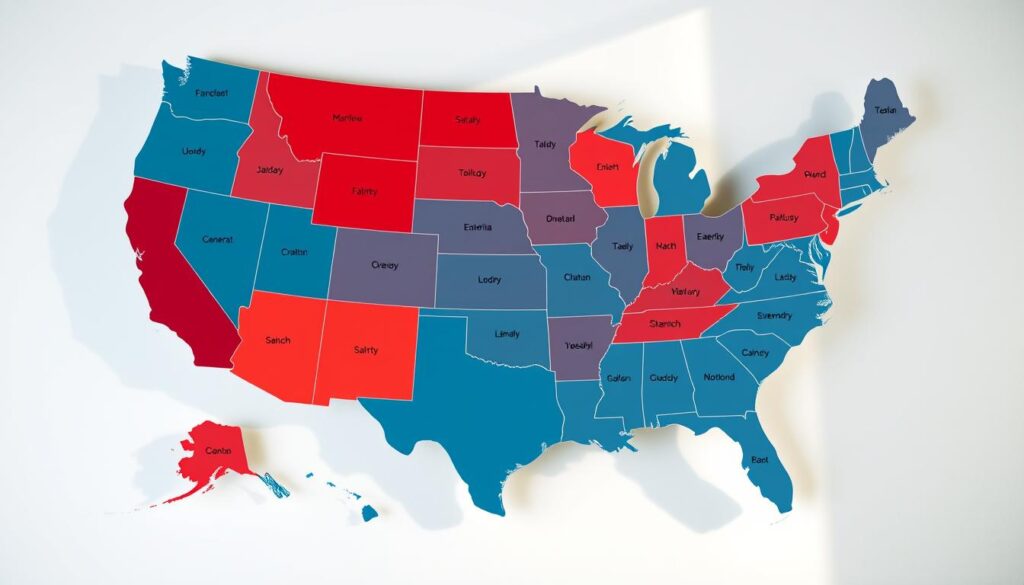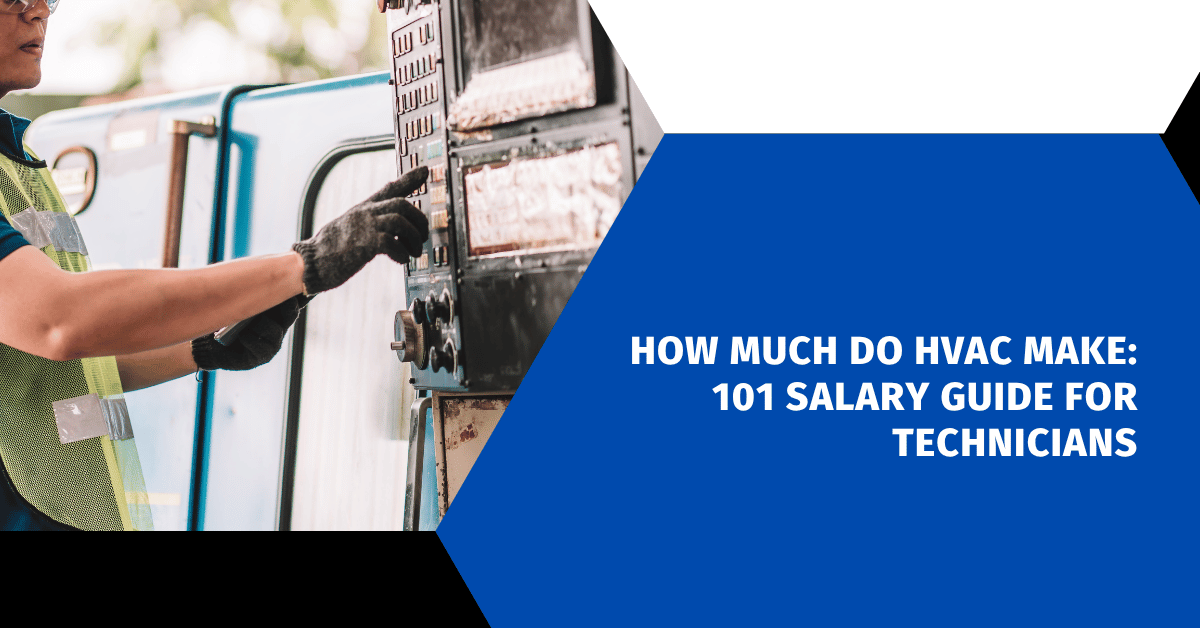Affiliate Disclosure
HVAC Guide Guys is a participant in the Amazon Services LLC Associates Program, an affiliate advertising program designed to provide a means for sites to earn advertising fees by advertising and linking to Amazon.
How Much Do HVAC Make? Ever wondered how much do HVAC technicians make? Knowing their salary can be a big deal for those thinking about this career. It’s a field that’s both challenging and rewarding.

The HVAC industry is full of chances for those who are skilled. Technicians can earn a median of $48,730 a year. And the best ones can make up to $77,920 annually. It’s a surprising amount for a technical job.
This guide will cover everything about HVAC technician salaries. We’ll look at starting jobs and specialized roles. You’ll learn what affects your salary and how to grow in your career.
Key Takeaways
- Median HVAC technician salary ranges around $48,730 annually
- Top 10% of professionals can earn up to $77,920 per year
- Salary varies based on experience, location, and specialization
- Career offers strong growth in technical trades
- Certifications and advanced skills can significantly boost earnings
Table of Contents
Understanding HVAC Technician Salary Ranges
Exploring hvac installer income shows a complex world of compensation. Your earnings can change a lot based on many factors. These factors shape your career path.
HVAC technicians have different salary ranges. These ranges depend on their skills, experience, and demand in the market. Your earnings can grow a lot, depending on several key factors.
Base Salary Structure
The base of HVAC pay includes important parts:
- Hourly wage rates
- Annual base salary
- Overtime opportunities
- Performance bonuses
Factors Influencing Pay Scales
Your earnings are influenced by many factors:
- Geographic location
- Professional certification levels
- Specialized technical skills
- Years of professional experience
Industry Standards and Benchmarks
| Experience Level | Typical Annual Earnings | Potential Range |
|---|---|---|
| Entry-Level | $35,000 | $30,610 – $42,000 |
| Mid-Career | $55,000 | $45,000 – $65,000 |
| Experienced | $70,000 | $65,000 – $77,920 |
Understanding these salary dynamics can help you strategically navigate your HVAC career and maximize your earning.
Explore Our HVAC Shop
Looking for top-rated HVAC tools, parts, and accessories? Visit our shop and find the perfect solution for your needs.
Visit the ShopNational Average HVAC Technician Earnings in 2025
The HVAC industry is growing, and so are the paychecks for skilled workers. By 2025, HVAC engineers can expect higher earnings due to the increasing need for their skills. Knowing the average national salary can help you plan your career and set income goals.
Salary ranges for HVAC technicians are expected to rise, showing great growth opportunities. The pay varies based on several important factors:
- Geographic location
- Technical specialization
- Professional certifications
- Industry demand
Here’s what HVAC technicians can expect to earn on average in 2025:
| Experience Level | Projected Annual Salary | Key Characteristics |
|---|---|---|
| Entry-Level | $54,100 | 0-2 years of experience |
| Intermediate | $65,700 | 2-4 years of professional experience |
| Senior Technician | $77,200 | 4-7 years of advanced expertise |
Your salary in HVAC depends on your skills and keeping up with new tech. Getting specialized training and certifications can really increase your earnings.
Professional growth is the key to maximizing your HVAC career earnings.
How Much Do HVAC Make in Different Experience Levels
Your earnings in the HVAC field can change a lot as you gain more experience. Knowing how salaries grow helps you plan your career and set income goals.
HVAC wages change a lot with experience. Here’s what you can expect at each stage:
Entry-Level Positions (0-2 years)
At the start, your pay will show your learning curve. New HVAC techs usually make:
- Hourly wage range: $22-$25
- Annual salary: $42,000-$48,000
- Limited specialized skills
- Supervised work assignments
Mid-Career Development (2-4 years)
With more experience and skills, your pay will go up. Mid-career techs make:
- Hourly wage range: $27-$30
- Annual salary: $52,000-$58,000
- Increased technical competence
- More independent work responsibilities
Senior Technician Earnings (4-7 years)
Experienced HVAC pros earn more. Senior techs get a big pay boost:
- Hourly wage range: $32-$35
- Annual salary: $62,000-$70,000
- Advanced technical expertise
- Potential leadership opportunities
“Your HVAC profession wages grow exponentially with experience and skill development.” – Industry Expert
Keep learning and improving to grow your salary faster in this field.
Explore Our HVAC Shop
Looking for top-rated HVAC tools, parts, and accessories? Visit our shop and find the perfect solution for your needs.
Visit the ShopTop Paying States for HVAC Technicians

Exploring hvac job income in the United States shows some states pay more. Your salary as an HVAC technician can change a lot based on where you work.
Top states for HVAC technicians offer great chances for skilled workers. These places have high hvac salaries that match local economy and demand.
- Alaska: Leads with the highest average HVAC technician salaries
- Massachusetts: Known for robust compensation in metropolitan areas
- California: Offers high wages due to complex climate control needs
- Washington: Provides competitive salaries in tech-driven markets
- Connecticut: Demonstrates strong compensation for skilled technicians
What makes these states pay more includes:
- Extreme climate conditions needing advanced HVAC systems
- High cost of living in cities
- Strong local construction and renovation markets
- Advanced technological infrastructure
Knowing about these salary differences can help your HVAC career. Choosing the right place or market can really increase your earnings.
“Location can be a game-changer in your HVAC career earnings.” – Industry Expert
Major Metropolitan Areas with Highest HVAC Salaries
Location is key when looking at HVAC technician salaries. Salaries vary a lot across the United States.
Some cities are known for their high HVAC salaries. Your salary can change a lot based on where you work.
Urban vs. Rural Pay Differences
Urban areas pay more than rural ones. The difference is big:
- Metropolitan areas pay 20-35% more than rural areas
- Big cities need special HVAC skills for their complex systems
- Urban areas have more jobs, leading to higher wages
Cost of Living Adjustments
Big cities offer good salaries, but living costs are high. Cities like San Francisco and New York have high salaries, but living there can be expensive.
Market Demand Factors
Your salary depends on the local job market. Here are some cities with high demand:
- San Francisco: High salaries due to tech jobs
- New York City: Lots of commercial and home HVAC needs
- Seattle: Growing tech and building sectors
Knowing these differences can help you plan your HVAC career. It can help you earn more.
Benefits and Compensation Packages

When looking at hvac installer income, what they get paid is just part of the story. HVAC workers earn more than just a salary. They get benefits that make their job even more appealing.
What do HVAC technicians get in their compensation packages? A few main things:
- Health Insurance: They get full medical, dental, and vision coverage.
- Retirement Plans: They have 401(k) plans with company matches.
- Paid Time Off: They get vacation, sick, and personal days off.
- Training and Professional Development Opportunities
Employers know that good pay is not just about hourly wages. They offer more in their packages. This can include:
- Performance-based bonuses
- Tool allowances
- Vehicle maintenance reimbursement
- Uniform and safety equipment provisions
Specialized HVAC technicians get even better packages. Companies reward their skilled workers with extra benefits. These can be:
- Continued education credits
- Certification support
- Career advancement programs
Your total compensation as an HVAC technician goes well beyond your base salary, making it a financially rewarding career path.
Explore Our HVAC Shop
Looking for top-rated HVAC tools, parts, and accessories? Visit our shop and find the perfect solution for your needs.
Visit the ShopCareer Advancement and Salary Growth
Your HVAC career is full of chances for growth and higher pay. Planning well can help you earn more and find a fulfilling job in this fast-paced field.
To move up in your HVAC career, you need a solid plan. It’s important to keep learning and improving your skills. This will help you earn more and find better job opportunities.
Certification Impact on Earnings
Getting certified can really boost your income. Look into getting these certifications to show your skills:
- EPA Section 608 Certification
- NATE (North American Technician Excellence) Certification
- HVAC Excellence Professional Certifications
These certifications can make you 10-20% more valuable in the job market. They’re a great investment in your career.
Specialization Opportunities
Choosing a special area can greatly increase your earnings. Some high-paying areas include:
- Commercial HVAC Systems
- Industrial Refrigeration
- Green Technology Solutions
- Smart Home Integration
Management Track
With more experience, you can move into leadership roles. You might become:
- HVAC Service Manager
- Operations Supervisor
- Project Coordinator
- Technical Sales Representative
These roles come with more responsibility and better pay. Management jobs can even double your starting salary.
Comparing HVAC Salaries to Other Trades
Exploring career options in skilled trades is important. HVAC technicians have competitive wages, often matching other specialized jobs.
Looking at salaries across trades shows interesting facts:
- HVAC Technicians: Average annual salary of $55,000 – $65,000
- Electricians: Typical earnings range from $52,000 – $70,000
- Plumbers: Median annual income around $56,000 – $62,000
- Carpenters: Average wages between $48,000 – $55,000
Your earnings in HVAC depend on several things:
- Where you live
- How long you’ve been working
- Specialized certifications
- How much demand there is
Skilled trades offer great chances for those who invest in learning and improving skills. While salary comparisons are useful, your success in HVAC goes beyond just numbers.
The trades sector shows strong economic strength. HVAC technicians lead in essential service industries.
Industry Growth and Job Outlook
The HVAC industry is on the verge of big growth, opening up great career paths for technicians in the U.S. With a 5% job growth forecast from 2020 to 2030, your earning chances in HVAC are looking up.
Several key factors are driving this strong growth in the HVAC sector:
- Rising demand for energy-efficient heating and cooling systems
- Increasing focus on sustainable building technologies
- Regular replacement of aging HVAC infrastructure
- Growing residential and commercial construction markets
Your career in HVAC is tied to new tech and green rules. Salaries vary by state, with cities often paying more.
“The HVAC industry is not just growing—it’s evolving to meet 21st-century environmental and technological challenges.” – HVAC Industry Experts
The Bureau of Labor Statistics says skilled HVAC techs are in high demand. Those who keep learning and use new tech will find the best jobs.
| Job Growth Indicator | Percentage |
|---|---|
| Projected Industry Growth (2020-2030) | 5% |
| Expected New Job Openings Annually | 40,100 |
| Median Annual Wage | $50,590 |
As buildings get more complex and energy saving matters more, your HVAC skills will be more valuable. Keep learning and specializing to reach your career goals.
Explore Our HVAC Shop
Looking for top-rated HVAC tools, parts, and accessories? Visit our shop and find the perfect solution for your needs.
Visit the ShopFactors Affecting HVAC Technician Pay
Figuring out how much HVAC technicians make involves looking at many complex factors. Your salary can change based on several key elements. These factors can greatly affect your money in this fast-changing field.
HVAC professionals don’t all make the same. Many important things decide how much they earn in different places and jobs.
Geographic Location Impacts
Your location is a big factor in your salary. States and areas pay differently for many reasons:
- Local demand for HVAC services
- Cost of living in the area
- Economic growth of the region
- Need for special HVAC skills due to climate
Company Size Considerations
The size of your employer affects your salary. Bigger companies usually offer:
- Higher base wages
- Better benefits
- More chances to move up
- Clear salary increases
Technical Expertise Matters
Your skills and knowledge greatly increase your earning power. Advanced certifications and being an expert in certain HVAC systems can lead to better pay and jobs.
Staying up-to-date and learning new skills can boost your income in the HVAC field.
Conclusion
The HVAC industry is a great choice for a stable and rewarding career. Your income as an HVAC installer can change a lot. This depends on your experience, where you work, and what you specialize in.
Knowing what affects your earnings is key to success. Things like where you live, your technical skills, and getting certified can really make a difference. By always learning and improving, you can earn more and move up in your career.
The need for skilled HVAC technicians is growing. This means good pay, varied work settings, and chances to advance. Whether you’re new or looking to grow, HVAC offers a promising and well-paying career path.
Your success in HVAC depends on your dedication, eagerness to learn, and ability to adapt. Keep up with industry trends and improve your skills. This way, you can have a fulfilling and profitable career in this vital trade.

